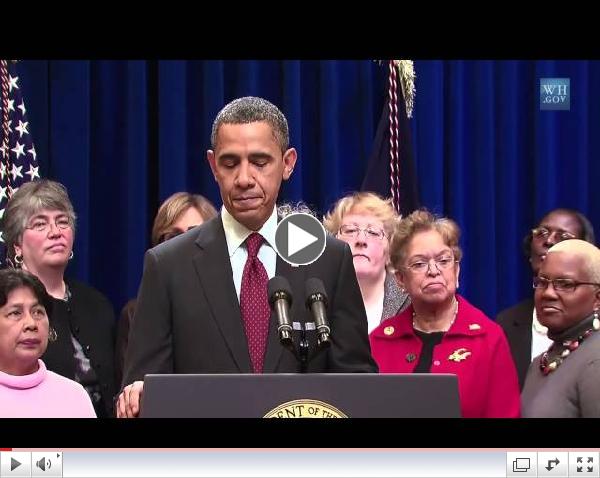The Direct Care News 
For direct care workers and their allies December 18, 2012
|
Anniversary Sparks Calls to Action on Home Care Rule
|
 Last Saturday marked the anniversary of a magnificent promise from President Obama to ensure basic labor protections for home care workers through the federal Fair Labor Standards Act. Last Saturday marked the anniversary of a magnificent promise from President Obama to ensure basic labor protections for home care workers through the federal Fair Labor Standards Act.
The rule was published, the public comments poured in and proved to be overwhelmingly favorable--and the wheels of justice stalled. A year later, home care workers still have no right to minimum wage or overtime pay.
But DCA and the other advocates behind the rule are working to remind the President of his promise, and their words rang out across the nation last week. Read more.
|
|
Direct from Washington, DC
|
 Senator Inouye, supporter of direct care worker rights, dies: Senator Daniel Inouye (D-HI), the first congressman from Hawaii and the second-longest serving Senator in American history, died yesterday, after 49 years in office. The Senator was an advocate for direct care workforce issues, including minimum wage and overtime protections for home care workers and paid sick days. Senator Inouye, supporter of direct care worker rights, dies: Senator Daniel Inouye (D-HI), the first congressman from Hawaii and the second-longest serving Senator in American history, died yesterday, after 49 years in office. The Senator was an advocate for direct care workforce issues, including minimum wage and overtime protections for home care workers and paid sick days.
Younger Medicare recipients could get thrown off fiscal cliff: Reducing healthcare spending is on the table as leaders in D.C. debate ways of avoiding sequestration--the so-called fiscal cliff. One of the leading proposals for reducing Medicare spending is raising the eligibility age from 65 to 67. Proponents cite increased life expectancy and projected federal government savings. Opponents argue that the change will cost more than it saves, shifting costs to states, employers, and consumers. Opponents also point out that those most affected by an increase in the Medicare eligibility age will include low-income Americans, manual laborers, and racial and/or ethnic minorities. Direct care workers, the majority of whom are from a racial or ethnic minority, have a lot at stake in the Medicare and larger budget debate.
States must fully expand their Medicaid programs in order to receive full federal funding: In 2014, The Affordable Care Act (ACA) will expand Medicaid eligibility to include anyone earning up to 138 percent of the federal poverty level (about $32,000 for a family of four). Since the Supreme Court ruled that states may choose whether or not to expand their Medicaid programs, some states have asked whether they could partially expand Medicaid and still receive the full federal payment. On December 10, Health and Human Services (HHS) Secretary Kathleen Sebelius announced that states must fully expand their Medicaid programs in order to receive additional federal funding. Nearly 400,000 currently uninsured direct care workers could gain access to health insurance through Medicaid expansion.
|
|
Tracking the Decline in Personal Care Aide Wages
|
 You probably knew wages for personal care aides (PCAs) are too low, but did you know they're getting getting worse, after adjusting for inflation? You can read all about it in The State Chart Book on Wages for Personal Care Aides, 2001-2011. Co-author and PHI Policy Research Analyst Abby Marquand recently answered our questions about the report. Click here to see what she had to say about how much real wages have dropped, which states pay least, and more. |